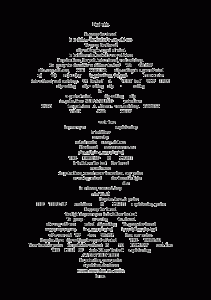
My piano students give me sour faces when I mention J.S. Bach. With good reason. Even his simplest pieces are deceptively difficult. The more advanced students grind their teeth when they have to tackle his fugues. They usually start out strong, but by the middle of the piece they have used up all their energy. I can feel their lead-weighted fingers going into spasms and the music would sag like a corpse being dragged to its final resting place.
There is a sense of playfulness in a fugue, where different voices “chase” each other, constantly morphing and colliding, appearing and disappearing. When Jack Foley talked to me about “multiplicity,” my mind went to the fugue, where a single entity spins and splits and manifests into different elements.
It must have been six months now since I told Jack I wanted to write a fugue—not a music composition, but a poem. Sometimes the brewing period does take that long. Friday (3/16) I sat down and wrote Fughetta (little fugue).
“I can’t help but think this is my break-through poem.” I told Jack.
He agreed.
